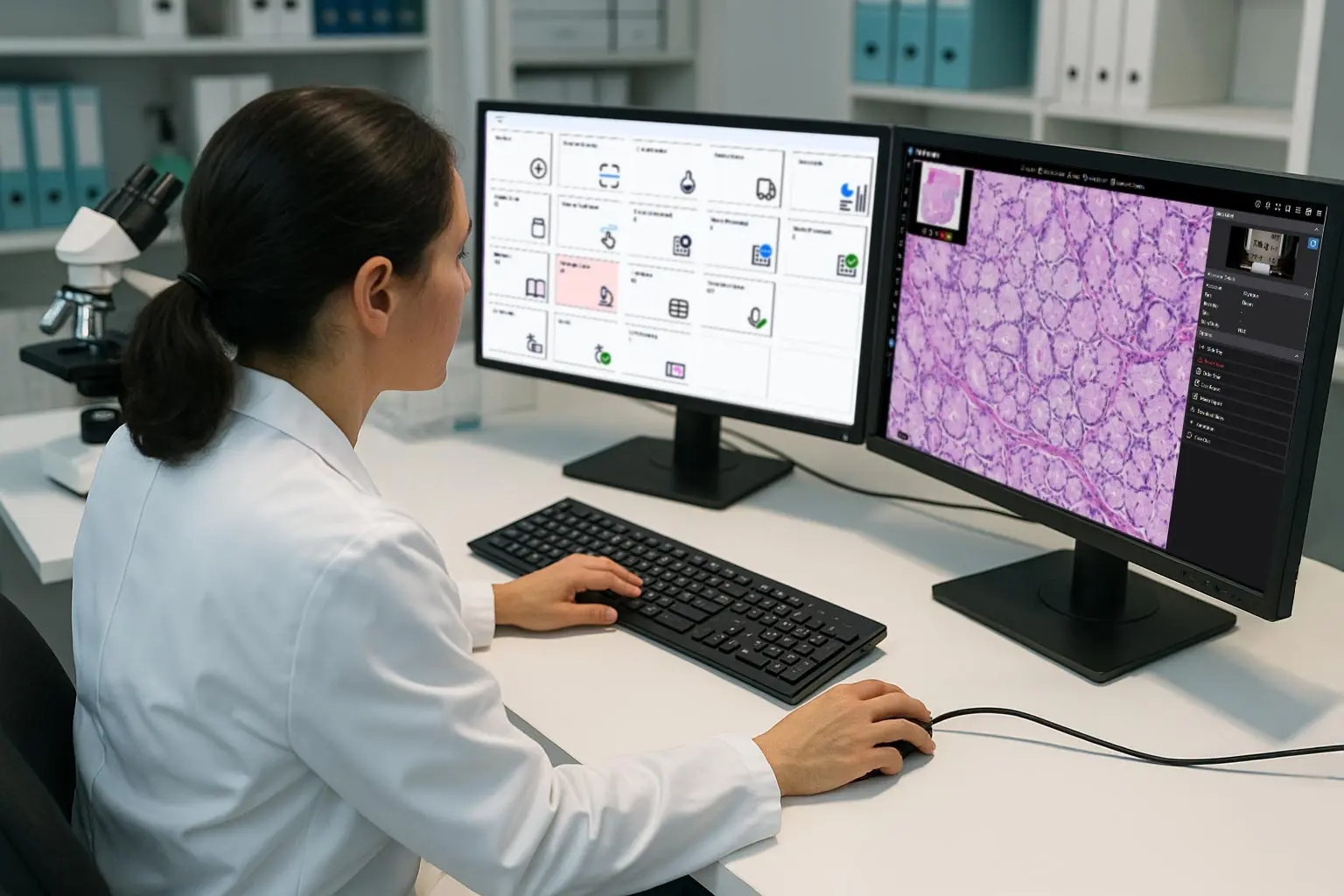Blog
Maximizing Your Lab’s Profitability: The Case for In-House Lab Billing
May 23, 2025
Laboratory revenue cycle management (lab RCM) is a complicated mix of data, payers, rules, requirements, and regulations. When dealing with complex coding, multiple insurance companies and clients, varying policies, and regulatory compliance, it’s easy to see why even the most successful pathology practices and clinical labs often struggle with denials and rejections.
With lab RCM presenting such a significant challenge to an organization’s bottom line and profitability, you’d think that getting it right would be the highest priority for lab leadership.
But if laboratory billing is a high priority, why do some labs outsource their laboratory revenue cycle management to a lab billing service?
In this blog post, we’ll cut through the sales pitch used by billing services to acquire your business and highlight why you should look past the hype and consider in-house lab billing backed by modern laboratory billing system software.
Learn More: The LigoLab Difference: Demonstrating the Power of Lab RCM Automation in the Clinical Laboratory
Laboratory Billing Services: The Sales Pitch
Let’s lead this discussion by examining the sales pitch laboratory billing services commonly use to attract clinical labs and pathology groups.
Cost
Laboratory billing services lead with this because even the most successful labs are built on slim margins and closely scrutinized operational budgets. These RCM cycle services promote a fixed cost (a percentage of collections or a flat fee) and push the perceived advantages of not hiring and managing salaried staff members, and using their software rather than paying for and maintaining in-house billing software for labs.
Efficiency
Laboratory billing services say they have an edge here because they claim to be specialists in this field. They also promote the ability to scale up or down based on a lab’s current needs, so with them, the lab can focus on its core functions rather than worrying about the ins and outs of the RCM process.
Expertise
Lab billing services claim to have industry knowledge and experience that differentiates them from the alternatives. They claim to have intimate knowledge of all healthcare regulations and compliance risks, and that their best practices and access to advanced laboratory billing system software technology make them the clear choice.
All sounds good, right? Based on the sales pitch, the decision to go with a lab billing service appears to be a no-brainer, but dig a little deeper, and it becomes clear that’s not always the case.
Industry Insights: Roundtable Discussion: Laboratory Billing Solutions and the Lab RCM Process

Laboratory Billing Services: The Reality
Now let’s concentrate on what’s missing from the sales pitch and focus on the real story.
The perceived cost savings of partnering with lab billing services start to unravel quickly when transparency, control, autonomy, customization, and motivation are factored in.
Transparency
“When the cat’s away, the mice will play.”
That old proverb can be used to describe the approach that lab billing services use with their customers because it’s a given that they will offer the lab a lot less transparency in day-to-day operations when compared to an in-house lab billing department using a modern laboratory billing system software, one equipped with advanced laboratory billing solutions such as real-time monitoring and customized reporting capabilities.
Many lab billing services claim to offer 'detailed reports' on lab RCM performance and analytics. However, these reports often function like a black box, lacking transparency and failing to disclose the criteria used to evaluate performance or justify decisions made on the lab’s behalf.
Outsourced laboratory revenue cycle management arrangements lack clarity and give lab billing services the cover and unchecked freedom to only go after the low-hanging fruit that’s easy to collect while avoiding the more time-consuming and difficult cases.
Ask yourself, is an outsourced billing service really and truly going to go the extra mile for my business and work every claim and every denial? Will it conduct a comprehensive audit of my laboratory billing process and aid in my lab’s continual process improvement when they have several other customers to service, too? Will they give me the full RCM cycle picture, or will they conveniently move on from the more challenging case and hope I don’t notice?
Add to this list of concerns the rise in ransomware attacks in the healthcare space, and how working with an outsourced RCM management company makes your lab more vulnerable to attack. Lastly, do you want to risk lab compliance by trusting that an organization from another country will correctly adhere to all HIPAA guidelines and securely protect all patient health information?
Saving a little money now could be very costly later, and certainly isn’t worth the risk.
Control and Autonomy
With something as important as being paid correctly and promptly for services rendered by your lab, is saving a little money by outsourcing worth losing direct oversight and total control over the entire laboratory billing process?
We recently consulted a nationally known healthcare expert to get his take on control and the importance of keeping your lab billing in-house, and all should note his response.
"Overall, it may cost two percent more to perform your lab billing tasks in-house, but recovery of collectible dollars can be nominal, and you gain the autonomy of control over laboratory billing process outcomes," he said.
By keeping lab RCM in-house and teaming with a modern RCM software provider with the latest laboratory billing solutions at its disposal, your lab’s billing department will know that all revenue opportunities are being captured and reimbursement rates optimized. Even better, the organization will benefit from the laboratory billing department’s growing knowledge of all processes and requirements, which will be evident by improving RCM cycle efficiency and productivity over time.
Customization
All labs are the same, except for their differences.
This is a common phrase often used to describe the lack of customized medical laboratory solutions to choose from.
All laboratory billing services claim to use state-of-the-art billing software for labs, but is that an actuality if the laboratory billing system can’t be customized to meet the specific needs of each laboratory client?
Modern lab RCM software developed for in-house lab billing comes with highly customized capabilities that billing departments need to navigate the myriad of challenges they face.
For example, the all-in-one medical LIS and lab billing LigoLab platform has a Rule Engine that gives users agency by allowing them to define and build any given lab RCM scenario with preconfigured rules. When strung together, the rules create a powerful automated RCM process workflow for what was once mostly manual tasks.
Now let’s take it to an even more granular level with preconfigured lab billing strategies.
Let's say the lab sent a claim to a payer, and it was accepted and paid at $98 instead of the $100 the lab was hoping for. With an advanced lab revenue cycle management system, the lab can create a preconfigured rule that automatically accepts the $2 loss and closes the case. That same rule can also be configured to keep the claim open and have it routed to a department decision-maker for further review if the loss is more than $2.
With this level of configurability and automation, the lab billing department is assured of maximum reimbursement for every claim, every time.
Learn More: Six Reasons Why You Should Choose an Integrated Laboratory Billing Solution for Your Medical Lab

Motivation
Now let’s address the big elephant in the room. What motivates laboratory billing services? Is it fighting on behalf of lab customers for every dollar? Or is it maximizing profitability at the expense of its lab customers?
“Let’s be honest. The motivation is in the wrong place. Laboratory billing services are motivated to maximize yield across all their clients in the least amount of time,” said LigoLab CEO Suren Avunjian.
Avunjian next provided an example of how a typical lab billing service operates.
“Let’s say the lab billing service has 100 lab customers with an X amount of staff. Based on this arrangement, the service can comfortably do its work and get payment for 80 percent of the lab claims it’s handling,” said Avunjian. “It accomplishes this by primarily concentrating on the low-hanging fruit.”
So what happens to the other 20 percent?
“Getting the last 20 percent, especially the last 5 to 10 percent, is hard and expensive. It requires more resources and time,” he said.
So if the billing service has 100 clients, does the easy work, and pulls in 80 percent of claims, that’s a lot of money coming into the business. To get the other 20 percent, it would need to expand its staff and work harder.
But why do that when the billing service can keep the same model and pursue another 50 laboratories while remaining unpunished for not going the extra mile for all its customers?
According to Avunjian, all perceived savings on labor and other lab costs are nullified when the lab realizes the laboratory billing service’s motivation isn’t aligned with the lab's financial goals.
The nationally known healthcare expert agreed with Avunjian, noting the need for a carrot or stick to motivate the outsourced RCM management company. The expert also said great lab billing comes from being intimately familiar with the lab or practice.
"Strong, venerable employees who work denials and payments will quickly catch errors,” he said. “On the other hand, if this work is being done by drone workers who are just moving digits, then so much is lost. Also, most outsourced billers won’t assign a whole team to one client, but if the lab does lab billing in-house, it gets a dedicated team and direct control over the outcome.”
Learn More: Is Your RCM Software Vendor Putting Your Lab’s Needs First?
Frustrated With Your Laboratory Billing Cycle? Give LigoLab a Try
“At LigoLab, we’re focused on maximizing the total yield for our lab RCM customers,” continued Avunjian. “Our laboratory billing system accomplishes this by covering and automating most of the laboratory billing cycle, allowing our customers to concentrate on work that requires a higher degree of expertise.”
Avunjian added that LigoLab’s RCM solution gives customers added value because the system is meticulously designed to ensure labs receive every penny they deserve.
“Our system operates with the utmost efficiency, transparency, and full compliance, guaranteeing that financial rewards match your laboratory's efforts and achievements,” said Avunjian, who also noted a key difference with LigoLab’s RCM software solution that legacy laboratory billing systems can’t match, and that’s integrated laboratory information system (LIS) and laboratory revenue cycle modules.
Learn More: The Power of Integration: Unleashing the Potential of LigoLab's LIS System & Lab RCM Platform
We’ll close this blog post with a case study highlighting what happened when a LIS system customer replaced its legacy, standalone RCM software with LigoLab’s integrated RCM module.

LigoLab: Redefining Lab Informatics With Modern Laboratory Information System Software
Since 2006, LigoLab has committed to partnering with its laboratory information system and laboratory billing clients, taking FULL RESPONSIBILITY for all their lab informatics needs.
LigoLab’s comprehensive and intuitive informatics platform features integrated modules for LIS system capabilities and laboratory revenue cycle management processes. These modules drive business growth and transform laboratories into information-driven and future-ready digital operations.
Learn more by connecting with a LigoLab Platform Expert!



.webp)


